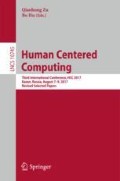Abstract
Postpartum depression (PPD) is a depressive disorder with peripartum onset, which brings heavy burden to individuals and their families. In this paper, we propose to detect PPD in depressed people via voices. We used openSMILE for feature extraction, selected Sequential Floating Forward Selection (SFFS) algorithm for feature selection, tried different settings of features, set 5-fold cross validation and applied Support Vector Machine (SVM) on Weka for training and testing different models. The best predictive performance among our models is 69%, which suggests that the speech features could be used as a potential behavioral indicator for identifying PPD in depression. We also found that a combined impact of features and content of questions contribute to the prediction. After dimension reduction, the average value of F-measure was increased 5.2%, and the precision of PPD was rose to 75%. Comparing with demographic questions, the features of emotional induction questions have better predictive effects.
Access this chapter
Tax calculation will be finalised at checkout
Purchases are for personal use only
References
Pitt, B.: ‘Atypical’ depression following childbirth. Br. J. Psychiatry 114(516), 1325–1335 (1968)
Burke, L.: The impact of maternal depression on familial relationships. Int. Rev. Psychiatry 15(3), 243–255 (2003)
American College of Obstetricians and Gynecologists. Committee on Obstetric Practice, Committee opinion no. 453: Screening for depression during and after pregnancy. Obstet. Gynecol. 115(2 Pt 1), 394–395 (2010)
Accounts Payable Association: Diagnostic and Statistical Manual of Mental Disorders (DSM-5®). American Psychiatric Publishing (2013)
Kramer, E.: Elimination of verbal cues in judgments of emotion from voice. J. Abnorm. Soc. Psychol. 68(4), 390–396 (1964)
Cannizzaro, M., Harel, B., Reilly, N., Chappell, P., Snyder, P.J.: Voice acoustical measurement of the severity of major depression. Brain Cognit. 56(1), 30–35 (2004)
Sobin, C., Sackeim, H.A.: Psychomotor symptoms of depression. Am. J. Psychiatry 154(1), 4–17 (1997)
Nwe, T.L., Foo, S.W., De Silva, L.C.: Speech emotion recognition using hidden Markov models. Speech Commun. 41(4), 603–623 (2003)
Wu, S., Falk, T.H., Chan, W.-Y.: Automatic speech emotion recognition using modulation spectral features. Speech Commun. 53(5), 768–785 (2011)
Ellgring, H., Scherer, P.K.R.: Vocal indicators of mood change in depression. J. Nonverbal Behav. 20(2), 83–110 (1996)
Mundt, J.C., Vogel, A.P., Feltner, D.E., Lenderking, W.R.: Vocal acoustic biomarkers of depression severity and treatment response. Biol. Psychiatry 72(7), 580–587 (2012)
Flint, A.J., Black, S.E., Campbell-Taylor, I., Gailey, G.F., Levinton, C.: Abnormal speech articulation, psychomotor retardation, and subcortical dysfunction in major depression. J. Psychiatr. Res. 27(3), 309–319 (1993)
Mandal, M.K., Srivastava, P., Singh, S.K.: Paralinguistic characteristics of speech in schizophrenics and depressives. J. Psychiatr. Res. 24(2), 191–196 (1990)
Porritt, L.L., Zinser, M.C., Bachorowski, J.-A., Kaplan, P.S.: Depression diagnoses and fundamental frequency-based acoustic cues in maternal infant-directed speech. Lang. Learn. Dev. 10(1), 51–67 (2014)
Cohen, A.S., Kim, Y., Najolia, G.M.: Psychiatric symptom versus neurocognitive correlates of diminished expressivity in schizophrenia and mood disorders. Schizophr. Res. 146(1–3), 249–253 (2013)
Tolkmitt, F., Helfrich, H., Standke, R., Scherer, K.R.: Vocal indicators of psychiatric treatment effects in depressives and schizophrenics. J. Commun. Disord. 15(3), 209–222 (1982)
Cohen, A.S., Elvevåg, B.: Automated computerized analysis of speech in psychiatric disorders. Curr. Opin. Psychiatry 27(3), 203–209 (2014)
Cummins, N., Joshi, J., Dhall, A., Sethu, V., Goecke, R., Epps, J.: Diagnosis of depression by behavioural signals: a multimodal approach. In: Proceedings of the 3rd ACM International Workshop on Audio/Visual Emotion Challenge, New York, NY, USA, pp. 11–20 (2013)
Cohn, J.F., et al.: Detecting depression from facial actions and vocal prosody. In: 2009 3rd International Conference on Affective Computing and Intelligent Interaction and Workshops, pp. 1–7 (2009)
Yang, F., et al.: Clinical features of and risk factors for major depression with history of postpartum episodes in Han Chinese women: a retrospective study. J. Affect. Disord. 183, 339–346 (2015)
Eyben, F., Weninger, F., Gross, F., Schuller, B.: Recent developments in openSMILE, the Munich open-source multimedia feature extractor. In: Proceedings of the 21st ACM International Conference on Multimedia, New York, NY, USA, pp. 835–838 (2013)
Acknowledgments
This work was supported by the National Basic Research Program of China (973 Program) (No. 2014CB744603), and Natural Science Foundation of Hubei Province (2016CFB208).
Author information
Authors and Affiliations
Corresponding authors
Editor information
Editors and Affiliations
Rights and permissions
Copyright information
© 2018 Springer International Publishing AG
About this paper
Cite this paper
Wang, J. et al. (2018). Detecting Postpartum Depression in Depressed People by Speech Features. In: Zu, Q., Hu, B. (eds) Human Centered Computing. HCC 2017. Lecture Notes in Computer Science(), vol 10745. Springer, Cham. https://doi.org/10.1007/978-3-319-74521-3_46
Download citation
DOI: https://doi.org/10.1007/978-3-319-74521-3_46
Published:
Publisher Name: Springer, Cham
Print ISBN: 978-3-319-74520-6
Online ISBN: 978-3-319-74521-3
eBook Packages: Computer ScienceComputer Science (R0)

